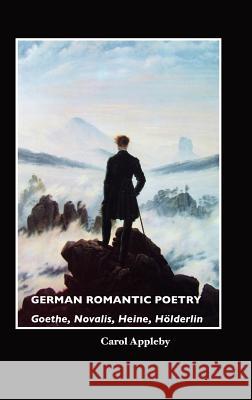German Romantic Poetry: Goethe, Novalis, Heine, H Lderlin » książka
German Romantic Poetry: Goethe, Novalis, Heine, H Lderlin
ISBN-13: 9781861713582 / Angielski / Twarda / 2012 / 184 str.
GERMAN ROMANTIC POETRY by Carol Appleby A study of German Romantic poetry, focusing on four of the great poets of the modern era: Johann Wolfgang von Goethe, Friedrich Holderlin, Heinrich Heine and Novalis. The book includes lengthy extracts from the poetry of German Romanticism, with a selection of poems by Goethe, Novalis, Holderlin and Heine at the back. This new edition (the 4th) has been revised. Illustrated. Notes, bibliography. SBN 9781861713584. 184 pages. AUTHOR'S NOTE: This book offers an introduction to four of the great German poets of the Romantic era aimed at first-time readers of poetry, students, but also readers familiar with their work. I have concentrated on the poetry, and have included many quotes. Some of the well-known poems by the writers are featured in the second half of the book. EXTRACT FROM THE FRIEDRICH HOLDERLIN CHAPTER Friedrich Holderlin believed in the notion of the poet as shaman, a vates, a prophet. As he wrote in 'An die Deutschen' ('To the Germans'), 'sweet it is to divine, but an affliction too'. And he believed in his poetic world, as poets have to: 'Holderlin's world was one in which he alone believed', wrote Alessandro Pelegrini. His poetry is marked by a movement towards bliss, the ecstasy of the shaman, which Holderlin does not hide. Rather, he cultivates it scrupulously. His lyrics are pure lyrics, set in the Orphic mode, that way of making poetry that comes from Orpheus, the ancient deity of shamanic poetry. Friedrich Holderlin's poetry, especially his early lyrics, is powerfully shamanic; it is full of shamanic imagery, as is the early poetry of Percy Bysshe Shelley or Francesco Petrarch. In Holderlin's art we find images of light, of bliss, of motion, of revelation, all shamanic/ religious motifs. Heinrich Heine's view of the poet as shaman was more political, aware of the role of the poet in societal revolutions: 'Our age is warmed by the idea of human equality, and the poets, who as high priests do homage to this divine sun, can be certain that thousands kneel down beside them, and that thousands weep and rejoice with them'.
GERMAN ROMANTIC POETRY by Carol Appleby
A study of German Romantic poetry, focusing on four of the great poets of the modern era: Johann Wolfgang von Goethe, Friedrich Hölderlin, Heinrich Heine and Novalis.
The book includes lengthy extracts from the poetry of German Romanticism, with a selection of poems by Goethe, Novalis, Hölderlin and Heine at the back. This new edition (the 4th) has been revised.
Illustrated. Notes, bibliography. SBN 9781861713584. 184 pages.
AUTHORS NOTE: This book offers an introduction to four of the great German poets of the Romantic era aimed at first-time readers of poetry, students, but also readers familiar with their work. I have concentrated on the poetry, and have included many quotes. Some of the well-known poems by the writers are featured in the second half of the book.
EXTRACT FROM THE FRIEDRICH HÖLDERLIN CHAPTER
Friedrich Hölderlin believed in the notion of the poet as shaman, a vates, a prophet. As he wrote in An die Deutschen (To the Germans), sweet it is to divine, but an affliction too. And he believed in his poetic world, as poets have to: Hölderlins world was one in which he alone believed, wrote Alessandro Pelegrini. His poetry is marked by a movement towards bliss, the ecstasy of the shaman, which Hölderlin does not hide. Rather, he cultivates it scrupulously. His lyrics are pure lyrics, set in the Orphic mode, that way of making poetry that comes from Orpheus, the ancient deity of shamanic poetry.
Friedrich Hölderlins poetry, especially his early lyrics, is powerfully shamanic; it is full of shamanic imagery, as is the early poetry of Percy Bysshe Shelley or Francesco Petrarch. In Hölderlins art we find images of light, of bliss, of motion, of revelation, all shamanic/ religious motifs. Heinrich Heines view of the poet as shaman was more political, aware of the role of the poet in societal revolutions: Our age is warmed by the idea of human equality, and the poets, who as high priests do homage to this divine sun, can be certain that thousands kneel down beside them, and that thousands weep and rejoice with them.











